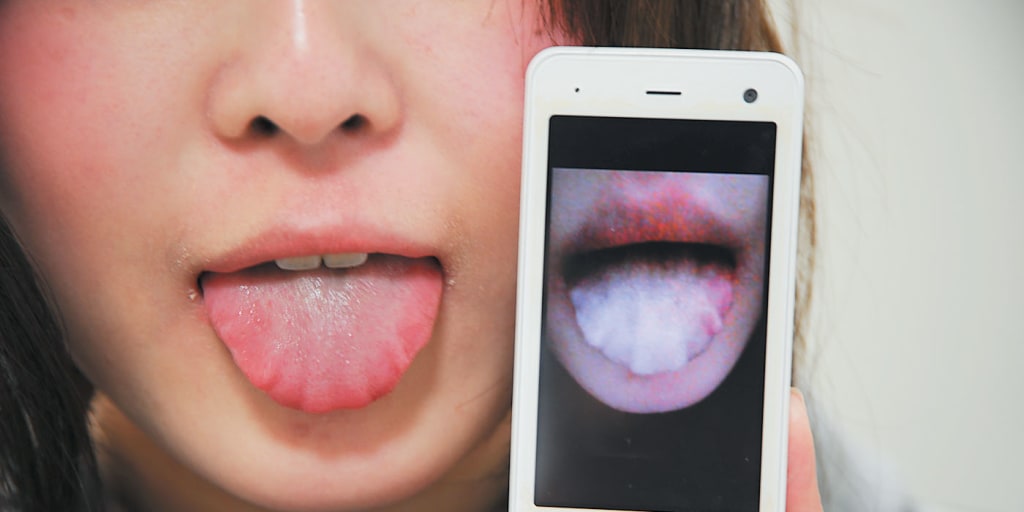Why Is My Tongue Numb? A Medically Reviewed Guide to Causes & Treatments

Key points
- Sudden weakness or numbness in your face, arm, or leg, especially on one side of the body.
- Facial drooping on one side when you try to smile.
- Difficulty speaking, slurred speech, or trouble understanding others.
- Swelling of the tongue, lips, or throat.
- Difficulty breathing or swallowing.
- A sudden, severe headache, dizziness, or loss of balance.
Feeling numbness or a "pins-and-needles" sensation in your tongue can be a strange and unsettling experience. Known medically as lingual paresthesia, this symptom can arise from a vast array of causes, from something as simple as biting your tongue to being a warning sign of a serious medical condition.
This comprehensive guide, synthesized from medical reports and expert sources, will help you understand the potential causes of tongue numbness, differentiate the symptoms, and know when it's crucial to seek medical attention.
When to Seek Immediate Medical Attention
While many causes of tongue numbness are not emergencies, some are. If you experience sudden tongue numbness along with any of the following symptoms, call 911 or go to the nearest emergency room immediately. These can be signs of a stroke, TIA ("ministroke"), or a severe allergic reaction (anaphylaxis).
- Sudden weakness or numbness in your face, arm, or leg, especially on one side of the body.
- Facial drooping on one side when you try to smile.
- Difficulty speaking, slurred speech, or trouble understanding others.
- Swelling of the tongue, lips, or throat.
- Difficulty breathing or swallowing.
- A sudden, severe headache, dizziness, or loss of balance.
The F.A.S.T. acronym is a critical tool for recognizing a stroke:
- Face: Does one side of the face droop?
- Arms: Is one arm weak or numb?
- Speech: Is speech slurred?
- Time: Time to call 911 immediately.
Common and Temporary Causes of a Numb Tongue
Often, the reason for a numb tongue is temporary and resolves on its own. These common causes include:
Minor Injuries and Oral Irritations
- Accidental Bites: Biting your tongue while eating or speaking can cause temporary numbness and pain.
- Burns: Hot food or beverages can scald your tongue, leading to a tingling or numb sensation as the tissue heals.
- Canker Sores and Cold Sores: These painful ulcers can cause localized tingling or numbness in the immediate area before and during their appearance.
Allergic Reactions
A tingling or numb tongue is a classic symptom of an allergic reaction.
- Oral Allergy Syndrome (OAS): This occurs when your immune system mistakes proteins in certain raw fruits, vegetables, or nuts for allergy-causing pollen. It can cause a sudden, itchy or tingly sensation in your mouth and on your tongue.
- Food Allergies: Allergies to foods like shellfish or nuts can also trigger numbness and swelling.
 Canker sores can cause localized tingling and numbness. Source: MedicalNewsToday
Canker sores can cause localized tingling and numbness. Source: MedicalNewsToday
Dehydration and Dry Mouth
When you're dehydrated, your body produces less saliva, leading to dry mouth (xerostomia). This lack of moisture can cause a rough, sticky, or even numb feeling on the tongue.
Medication Side Effects
Certain prescription medications, such as some blood pressure drugs or antibiotics, can list paresthesia as a side effect. If you suspect your medication is the cause, consult your doctor. Never stop taking a prescribed medication without medical advice.
Medical Conditions Linked to Tongue Numbness
If the numbness is persistent, recurrent, or accompanied by other symptoms, it may be linked to an underlying medical condition.
Nutritional Deficiencies
Your nerves require specific vitamins and minerals to function properly. A deficiency in any of the following can lead to nerve-related symptoms like tongue numbness:
- Vitamin B12: Crucial for nerve health. Deficiency can also cause a sore, red tongue and fatigue.
- Folate (Vitamin B9)
- Iron, Zinc, or Phosphorus
- Calcium (Hypocalcemia): Low blood calcium can cause tingling around the mouth, as well as in the hands and feet.
Neurological Conditions
The nerves that provide sensation to your tongue originate in the brain. Any condition affecting these nerves can cause numbness.
- Stroke and TIA: As mentioned, these are emergencies where blood flow to the brain is blocked.
- Multiple Sclerosis (MS): An autoimmune disease where the immune system attacks the protective covering of nerves. Numbness or tingling in the face, tongue, or other body parts is a common symptom, often referred to as "MS tongue." These symptoms can come and go.
- Bell's Palsy: This condition causes sudden, temporary weakness or paralysis of the facial muscles on one side. As one woman shared in her story with PEOPLE.com, her experience began with her tongue going numb before half of her face stopped working.
- Migraine with Aura: Some people experience sensory disturbances, known as an aura, before or during a migraine headache. This can include a tingling or numb sensation in the tongue, lips, or face that typically lasts less than an hour.
- Nerve Damage: The lingual nerve, which controls sensation in the tongue, can be damaged during dental procedures (like wisdom tooth removal), oral surgery, or from a tongue piercing. This can result in persistent, long-term numbness.
Metabolic and Autoimmune Disorders
- Hypoglycemia (Low Blood Sugar): A sudden drop in blood sugar can cause numbness or tingling in the tongue and lips, often accompanied by shakiness, sweating, and anxiety.
- Raynaud's Phenomenon: This condition causes blood vessels, usually in the fingers and toes, to spasm and narrow in response to cold or stress. In rare cases, it can affect the tongue. A fascinating case reported by NBC News detailed a woman who photographed her tongue turning completely white and numb during an attack.
 A photo taken by a patient showing lingual Raynaud's phenomenon, where the tongue turns white and numb due to lack of blood flow. Source: NBC News / New England Journal of Medicine
A photo taken by a patient showing lingual Raynaud's phenomenon, where the tongue turns white and numb due to lack of blood flow. Source: NBC News / New England Journal of Medicine
Psychological Factors
- Anxiety: High levels of stress or anxiety can trigger physical symptoms. A tingling or numb tongue can be a manifestation of the body's "fight-or-flight" response, a condition sometimes called psychogenic oral paresthesia.
- Burning Mouth Syndrome (BMS): A chronic and complex condition characterized by a burning or tingling sensation in the mouth, often without a clear cause. Numbness can also be a symptom. Anxiety and depression are often linked with BMS.
The Diagnostic Process: What to Expect from Your Doctor
If you see a doctor for unexplained tongue numbness, they will follow a systematic pathway to identify the cause.
- Patient History: Expect questions about when the numbness started, whether it's constant or intermittent, and if you have other symptoms. Your doctor will also review your medical history, medications, and diet.
- Physical Exam: An examination of your tongue, mouth, and head, along with a neurological assessment to check your reflexes and muscle strength.
- Diagnostic Tests: Depending on the suspected cause, your doctor may order:
- Blood Tests: To check for vitamin deficiencies, low calcium or glucose, and signs of infection or autoimmune disease.
- Imaging: An MRI or CT scan of the brain may be used to rule out a stroke, MS, or other neurological issues.
- Allergy Testing: Skin-prick or blood tests can identify potential allergens.
Treatment and Management of Tongue Numbness
Treatment is entirely dependent on the underlying cause.
- For Deficiencies: Vitamin or mineral supplements (oral or injections).
- For Allergies: Antihistamines and avoidance of the trigger.
- For Infections: Antibiotic or antiviral medications.
- For Hypoglycemia: Consuming a fast-acting source of sugar, followed by a protein-rich meal.
- For Neurological Conditions (MS, Migraines): Specific prescription medications to manage the condition.
- For Anxiety: Stress management techniques, psychotherapy, and sometimes anti-anxiety medication can help alleviate physical symptoms.
- For Nerve Damage: The numbness may improve over time. In some cases, oral physiotherapy or medications for nerve pain (like gabapentin) may be recommended.
For temporary relief at home, you can try staying hydrated, avoiding irritants like very spicy foods and alcohol, and maintaining good oral hygiene.
Ultimately, a numb tongue is a symptom, not a disease. While it can be caused by minor issues, it should not be ignored. Paying attention to other accompanying signs and consulting a healthcare professional is the best way to ensure your health and peace of mind.
References
- MedicalNewsToday: Tingling tongue: Causes and when to see a doctor
- WebMD: Tingling Tongue: Possible Causes
- Vinmec International Hospital: Why Have You Lost Sensation in Your Tongue?
- PEOPLE.com: Woman Documents Recovery After Half of Her Face Stopped Working
- NBC News: The curious case of a numb tongue
- Mass General Brigham: MS Swallowing Problems and MS Tongue

About the author
Benjamin Carter, MD, is a board-certified otolaryngologist specializing in head and neck surgery, with an expertise in treating throat cancer. He is an associate professor and the residency program director at a medical school in North Carolina.